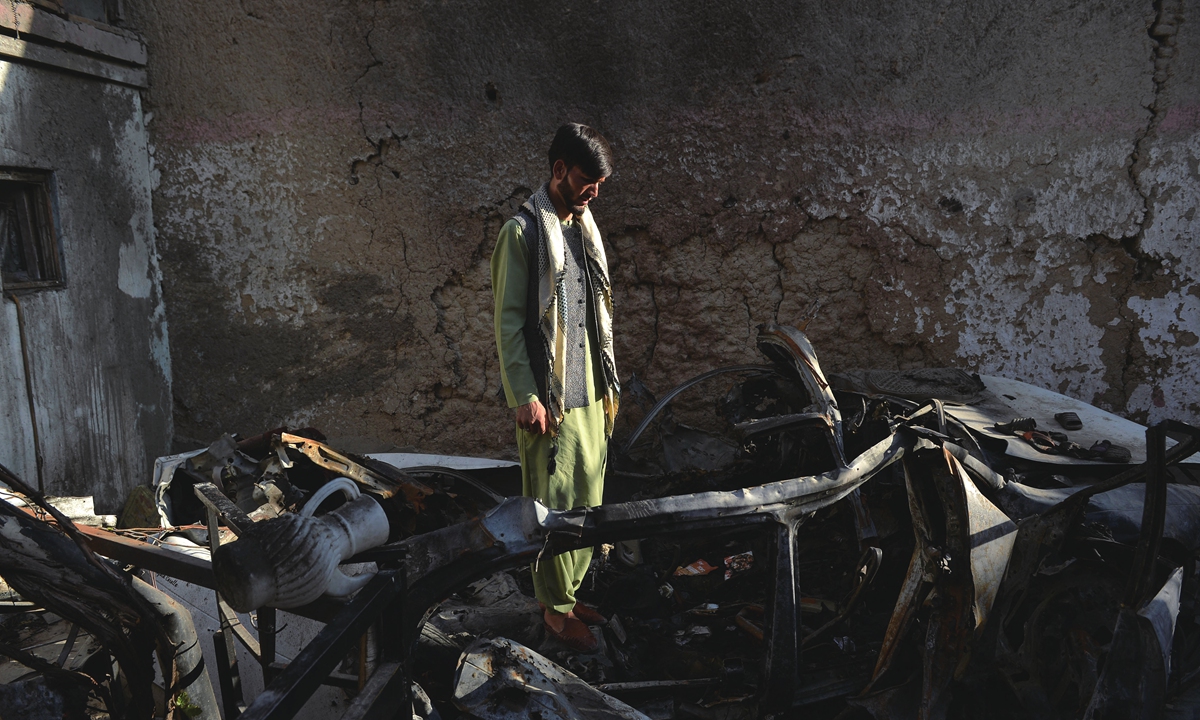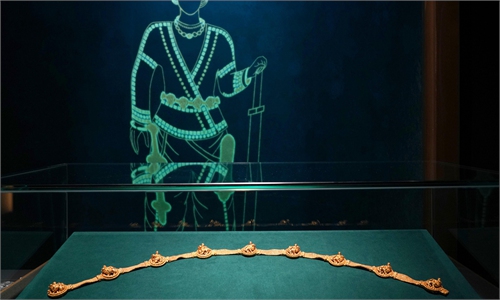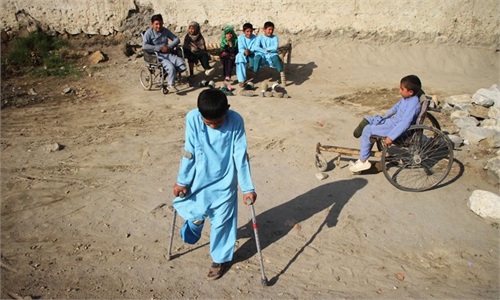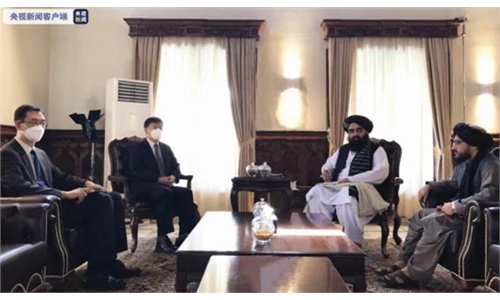
A resident stands amid the debris of a house damaged in a US drone strike in the Kwaja Burga neighborhood of Kabul on September 18, 2021. Photo: AFP
"It was a mistake." The US military on September 17 changed course amid huge international public opinion pressure and solid evidence provided by a pair of media investigations. It admitted that the deadly US drone strike in Kabul on August 29, which it had previously defended as a "righteous strike," was a "tragic mistake" that killed 10 civilians, including a humanitarian worker and seven children, instead of terrorist targets. General Frank McKenzie, commander of US Central Command, offered an apology for the error. But then what? Demands from the victims' families for a probe into the "blatant crime" and for the perpetrators to be brought to justice have been ignored. No US personnel responsible for the killings has been investigated or punished so far.In the 20-year-long Afghanistan war, the US has committed horrible war crimes in the country. But Washington and the Pentagon usually refuse to acknowledge them, and try to cover up the truth. It also shields criminals and deals with them leniently. This is done even when the evidence of wrongdoing is staring them in the face. The US also imposed sanctions on the International Criminal Court (ICC), which started an investigation into US war atrocities in Afghanistan. Washington has shown zero sincerity to reflect upon the crimes it committed against the Afghan people.
Horrible crimes
In November 2020, a war crimes inquiry found that there was "credible information" to prove that the Australian Special Forces in Afghanistan had unlawfully killed 39 civilians and detainees and cruelly treated two persons. This sparked global outrage. The Afghanistan Independent Human Rights Commission later called on other nations, especially the US and the UK, to also open inquiries to investigate possible unlawful killings by their forces in Afghanistan. Neither the US nor the UK has made moves in this direction. But it's widely believed that if a systematic investigation is carried out into US forces, the results would be more appalling and horrible.
The Costs of War project by Brown University estimates that over 46,000 Afghan civilians lost their lives during the longest war in US history. The errant drone strike on August 29 wasn't the first time Afghan civilians have been killed in drone strikes under the broad banner of the war on terror. Data published in May by Action on Armed Violence (AOAV), a London-based charity, showed that 3,977 casualties were caused by US-led airstrikes between 2016 and 2020. Among them, 1,598 were children.
Ordinary Afghans say it had happened to them many times, most of which, however, had not been reported. Innocent Afghans might simply be on their way to carry water, graze cattle or collect wood when the drones strike.
In 2010, it was also reported that 12 American soldiers based in Kandahar province in southern Afghanistan formed a secret "kill team" that allegedly blew up and shot Afghan civilians at random and collected their fingers as trophies.
Besides civilian killings, there are also many allegations over the US forces' torture, mistreatment and killings of prisoners in Afghanistan. In 2016, in response to a Freedom of Information Act lawsuit filed more than a decade ago by the American Civil Liberties Union, the US Defense Department had to release nearly 200 photographs related to prisoner abuse at US military facilities in Iraq and Afghanistan. The photos were a part of a larger set of 2,000.
The ICC in March 2020 asked its chief prosecutor to open an investigation into allegations of war crimes in Afghanistan, including any that may have been committed by Americans. The court said it had enough information to prove that US forces had "committed acts of torture, cruel treatment, outrages upon personal dignity, rape and sexual violence" in Afghanistan in 2003 and 2004. But until now, no case has been opened largely because of the US' obstruction and refusal to cooperate.
Afghanistan has been an ICC member country since May 1, 2003; therefore, the court has the power to prosecute crimes committed in the country. However, Washington, claiming it's not a member of the ICC, made it clear that it would not cooperate. This made it very difficult for the prosecutor to establish sufficient evidence to charge the suspects and advance the judicial procedure.
Barrier to justice
It could be said that the US has provided the biggest umbrella over potential criminals who were suspected of committing war crimes in Afghanistan. For one thing, it treated a small number of criminals, whose crimes were too prominent and appalling to hide, with leniency. For another, it has tried hard to obstruct international judicial bodies' investigations into war crimes by the US in Afghanistan.
Xue Lei, a research fellow at the Department of International Organization and International Law of Shanghai Institutes, told the Global Times that it's hard to hold criminals who committed war crimes in Afghanistan to account. One of the reasons, he noted, is that it's the US that has the jurisdiction over war crimes committed in Afghanistan by US soldiers. And a regrettable fact is that the US' legal system is inadequate to give the criminals the due penalty they deserve.
The US also trampled upon international rules and brutally obstructed the ICC's investigation into alleged war crimes US forces committed in Afghanistan in order to cover up the US military's scandals. In response to the Hague-based ICC's decision to investigate whether US forces committed war crimes in Afghanistan, the US in September 2020 imposed sanctions on senior officials of the ICC, including the chief prosecutor Fatou Bensouda. It also restricted the issuance of visas for ICC staff involved in "efforts to investigate US personnel."
Although the Biden administration, which trumpets so-called human rights more loudly, revoked the Trump-era sanctions on the ICC in early April, it wouldn't cooperate with the ICC's investigation into war crimes by US forces in Afghanistan, Xue noted, adding that it's pretty difficult for the ICC to advance its probe.
The hypocrisy of the US is obvious to all: It says one thing, but does quite another. Washington has been claiming to defend "human rights" all day long. But when international institutions try to investigate its crimes against humanity, it shamelessly undermined fairness and justice by slapping sanctions. It is a bloodthirsty country that is accustomed to killing and trampling upon human rights in other countries and has no remorse over its war crimes. It even tries hard to cover up truth and excuse and shield criminals. How could such a country call itself a beacon of democracy and human rights?
More efforts needed
The ICC should continue pushing forward the investigation into the US, Zhang Tengjun, deputy director of the Department for Asia-Pacific Studies at the China Institute of International Studies, told the Global Times. The UN should also act by condemning through resolutions the war crimes committed by the US and its allies in Afghanistan and should initiate inquiries and prosecution, Zhang noted.
However, Zhang is also concerned that the ICC and many other international institutions cannot impose effective restrictions on the US due to the country's hegemonic position and mind-set.
The existing order is established with the US' participation. But when the US thinks the mechanism will hurt its interests, it will not hesitate to disregard the rules. Washington will go all out to pull itself out of relevant treaties, and even sanction the entities in charge.
More efforts are needed to hold the US to account for the war crimes it committed in Afghanistan and other countries. The vast human rights groups and non-governmental organizations can provide extra help to gather evidence. They can also help guide public opinion to focus more on this issue to exert a certain degree of pressure on the US.




